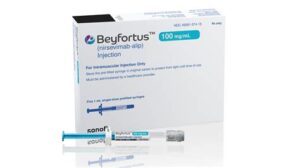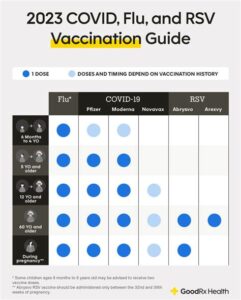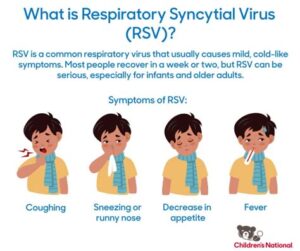Discover the side effects of the RSV vaccine, their duration, factors influencing them, management tips, and when to seek medical help.
Understanding RSV Vaccine Side Effects
The RSV vaccine, designed to protect against respiratory syncytial virus, can prompt various side effects, similar to many other vaccines. The majority of these effects are generally mild and temporary, but understanding what to expect is crucial for better preparedness.
- Pain or swelling at the injection site
- Fever
- Fatigue
- Headache
In some cases, individuals may experience mild gastrointestinal symptoms, but these are less frequent. It’s important to note that more severe side effects are rare. If they do occur, they typically manifest within a few days post-vaccination and resolve on their own within a short period.
Remember, while the focus on side effects may seem daunting, the benefits of receiving the RSV vaccine in preve
Typical Duration of RSV Vaccine Side Effects
The respiratory syncytial virus (RSV) vaccine is designed to provide protection, but like any vaccine, it can come with side effects. Understanding how long these side effects typically last can help individuals manage their expectations and prepare accordingly.
Most side effects from the RSV vaccine are mild and may include symptoms such as pain at the injection site, fever, and fatigue. These effects usually manifest within the first few days following the vaccination. On average, the duration of these side effects is about 1 to 3 days. However, some individuals might experience lingering effects for up to a week.
It’s important to note that while the side effects are generally short-lived, they can vary based on individual factors such as age, health status, and the specific vaccine formulation used. If side effects persist beyond a week or worsen, it’s advisable to consult a healthcare professional.
Factors Affecting Side Effects Duration
When considering the duration of side effects from the RSV vaccine, it’s important to understand that several factors can contribute to how long these effects may last. Individuals may react differently based on a range of variables, which can influence the overall experience post-vaccination.
- Individual Health Status: People with underlying health conditions may experience prolonged side effects, while those in good health may recover more quickly.
- Age: Younger individuals often have more robust immune responses, which can potentially minimize the duration of side effects.
- Immune Response: The body’s immune response to the vaccine may result in varying levels of side effects. A stronger immune response could mean more noticeable, but shorter-lived side effects.
- Type of Vaccine: Different formulations of the RSV vaccine may lead to differing side effect profiles and durations.
In summary, the duration of side effects from the RSV vaccine can vary widely based on these factors. Monitoring your body’s response and staying informed about what to expect can help manage any post-vaccine experiences effectively.
Managing Side Effects of RSV Vaccine
Receiving the RSV vaccine is an important step in protecting yourself and your loved ones from respiratory syncytial virus. However, like any medical intervention, it may come with some side effects. Understanding how to manage these side effects can significantly enhance your experience with the vaccine.
Common side effects may include soreness at the injection site, mild fever, or fatigue.
- Apply a cool compress to the injection site to relieve soreness and reduce swelling.
- Stay hydrated by drinking plenty of fluids, especially if you experience any fever.
- Rest adequately to allow your body to recover and feel better.
- Consider over-the-counter medications such as ibuprofen or acetaminophen for fever and pain relief, but consult with your healthcare provider first.
It’s important to monitor your symptoms. If you find that the side effects become severe or persist longer than expected, consult your healthcare professional. They can provide guidance tailored to your specific situation and ensure your well-being following the RSV vaccination.
Lastly, keep an open line of communication with your healthcare provider about any concerns you may have regarding the RSV vaccine and its side effects. They can offer valuable advice and reassurance as you navigate your vaccination journey.
When to Seek Medical Assistance
After receiving the RSV vaccine, most individuals may experience mild to moderate side effects. These are typically temporary and can include soreness at the injection site, mild fever, and fatigue. However, there are certain situations where it is crucial to seek medical assistance promptly.
It’s important to monitor for any severe or unusual reactions that may follow vaccination.
- Difficulty breathing
- Swelling of the face or throat
- Fast or irregular heartbeat
- Severe headache or blurred vision
- High fever that persists beyond 48 hours
These symptoms may indicate a more serious allergic reaction or other complications requiring urgent medical intervention. As with any vaccination, it’s always better to err on the side of caution and consult a healthcare professional if you have any concerns regarding side effects.
Frequently Asked Questions
What are the common side effects of the RSV vaccine?
Common side effects of the RSV vaccine may include mild fever, fatigue, pain at the injection site, and muscle aches.
How long do side effects typically last after receiving the RSV vaccine?
Side effects from the RSV vaccine usually last between a few days to a week.
Are there any serious side effects associated with the RSV vaccine?
Serious side effects are rare, but may include allergic reactions. Always consult a healthcare professional if you experience severe symptoms.
Can side effects be managed at home after getting the RSV vaccine?
Yes, over-the-counter pain relievers such as acetaminophen or ibuprofen can help manage discomfort and fever.
Is it normal to feel tired after receiving the RSV vaccine?
Yes, feeling fatigued after vaccination is a common side effect and typically resolves within a few days.
Should I be concerned if my side effects last longer than a week?
If side effects persist longer than a week or worsen, it’s advisable to consult your healthcare provider for further evaluation.
What should I do if I experience severe side effects from the RSV vaccine?
Seek medical attention immediately if you experience severe or unusual symptoms after receiving the RSV vaccine.





